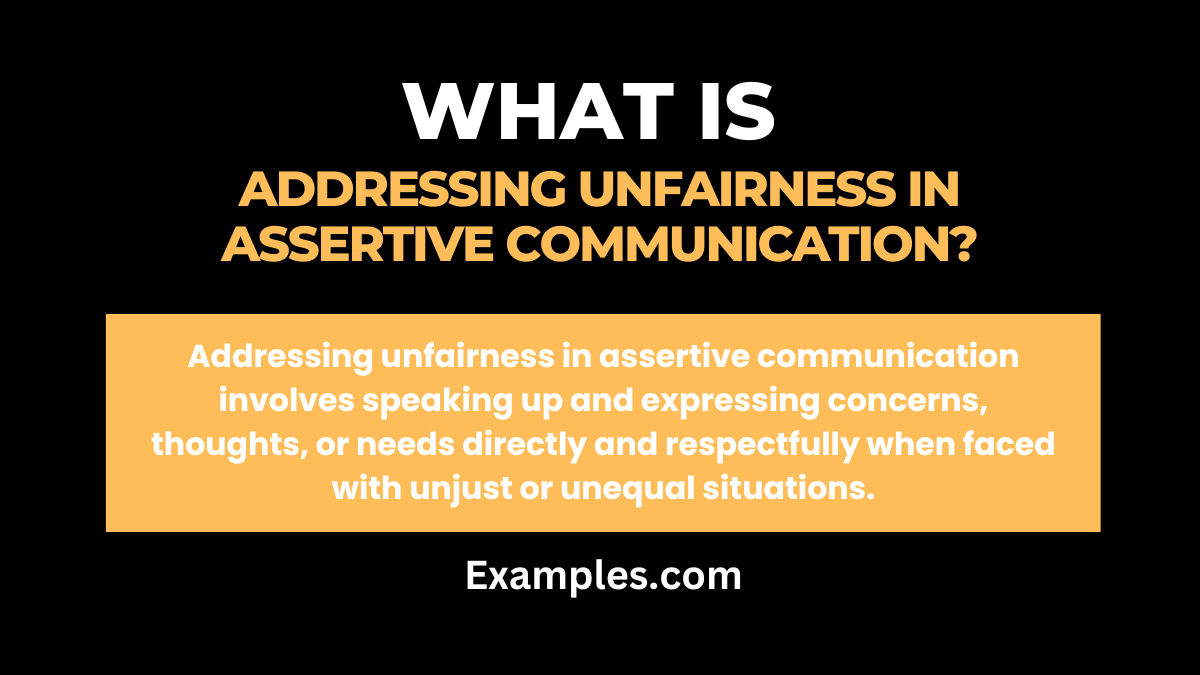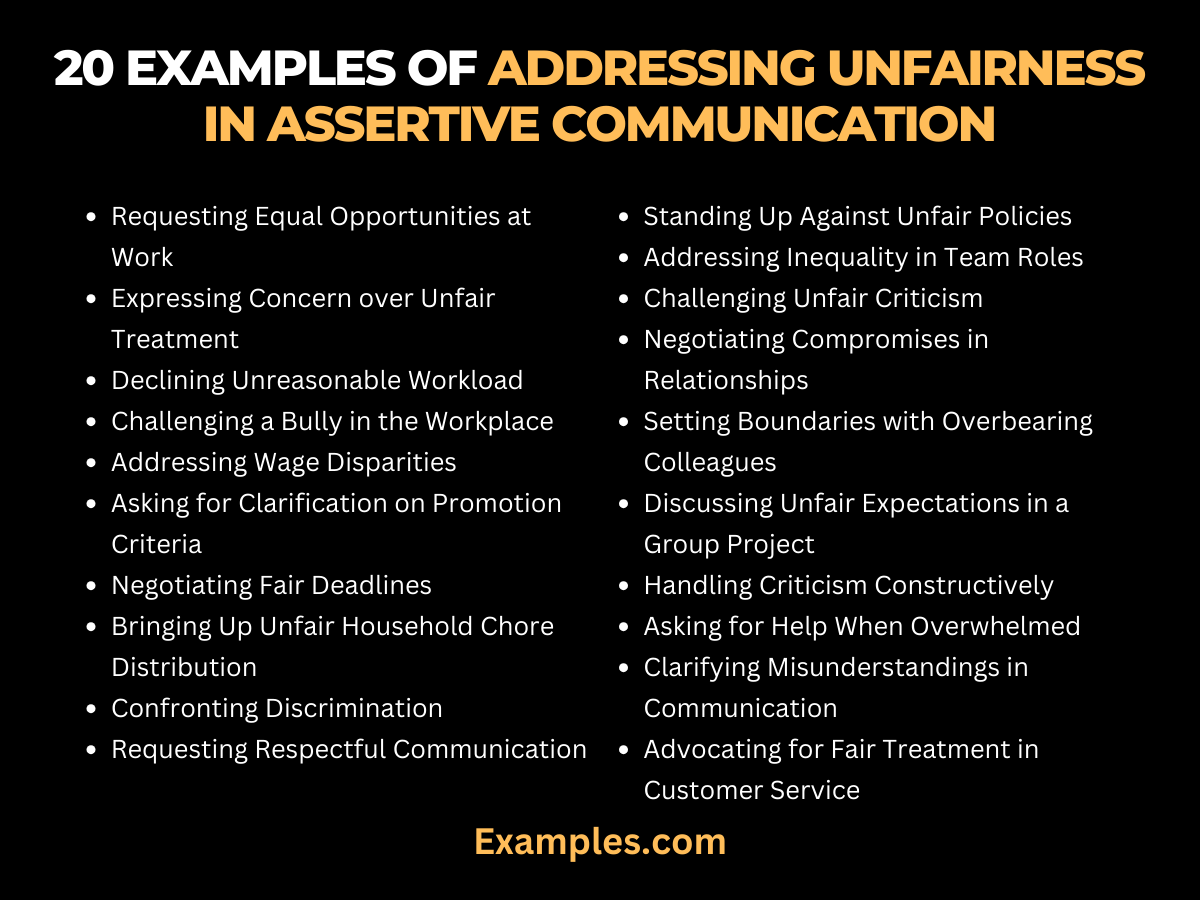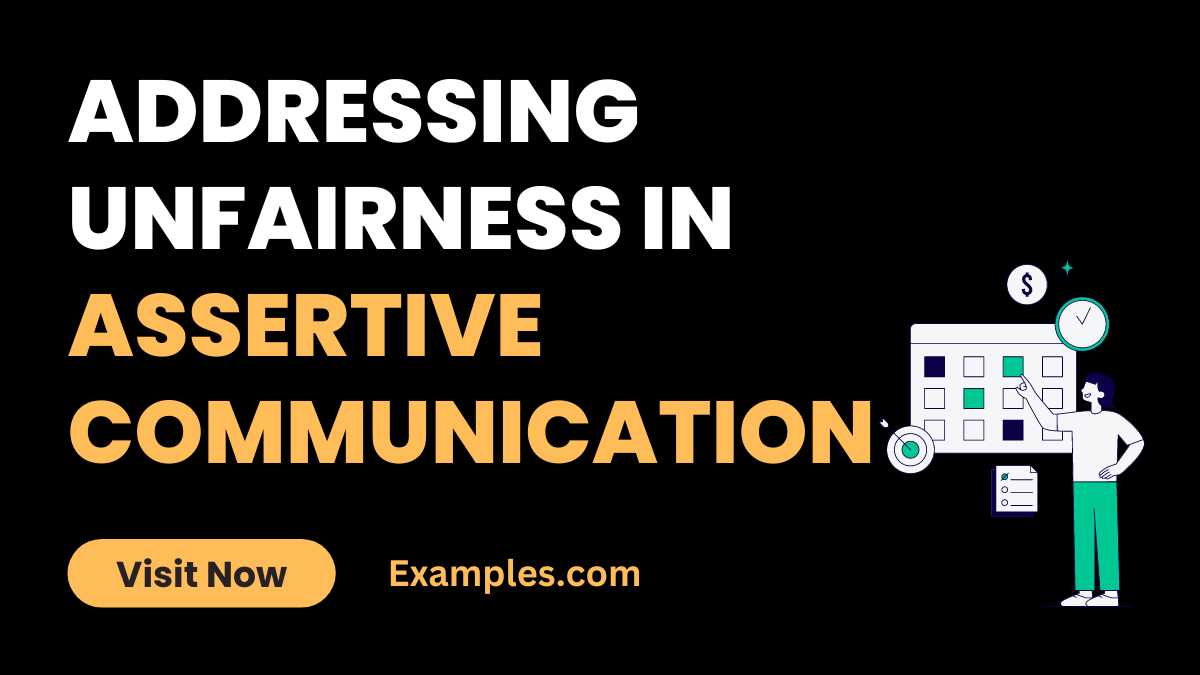Addressing Unfairness in Assertive Communication
In the dynamic world of communication, addressing unfairness assertively is crucial for maintaining healthy interactions. This guide delves into the nuances of Assertive Communication, specifically focusing on how to confront and address unfair situations. With practical oral communication examples, we will explore the ways to articulate concerns effectively, ensuring respect and clarity. Whether in professional settings or personal relationships, these insights will empower you to tackle unfairness with confidence and poise, enhancing your communication repertoire.
What is Addressing Unfairness in Assertive Communication?

Addressing unfairness in assertive communication involves speaking up and expressing concerns, thoughts, or needs directly and respectfully when faced with unjust or unequal situations. This approach combines confidence and clarity, ensuring one’s voice is heard without being aggressive or passive. It’s about standing up for fairness and equality, whether in personal relationships, at work, or in social settings. By using assertive communication, individuals aim to resolve issues of unfairness through open, honest, and respectful dialogue.
20 Examples of Addressing Unfairness in Assertive Communication
In today’s fast-paced world, addressing unfairness through assertive communication is crucial for maintaining healthy and respectful relationships. Assertive communication enables individuals to express themselves effectively, setting clear boundaries while respecting others. This approach is essential in various settings, including workplaces, relationships, and daily interactions. Here, we explore 20 unique and impactful examples of assertive communication in action, each accompanied by a brief explanation on how to effectively communicate in these scenarios.

- Requesting Equal Opportunities at Work: “I’ve noticed I haven’t been considered for recent project leads. I believe in my capabilities and would like to discuss how I can be given equal opportunities to contribute.”
- Expressing Concern over Unfair Treatment: “I feel that the way I was spoken to in today’s meeting was unfair. Can we discuss this issue respectfully?”
- Declining Unreasonable Workload: “While I am committed to the team’s success, taking on these additional tasks without proper compensation is not feasible for me. Let’s find a fair solution.”
- Challenging a Bully in the Workplace: “Your comments in the meeting were disrespectful. I expect professional behavior in our interactions.”
- Addressing Wage Disparities: “I’ve learned that my salary is not on par with others in similar roles. I would like to discuss adjusting my compensation to reflect my contributions and industry standards.”
- Asking for Clarification on Promotion Criteria: “Can you explain how decisions for promotions are made? I want to ensure I understand the process and how it applies equally to everyone.”
- Negotiating Fair Deadlines: “The deadline for this project seems unrealistic considering the workload. Can we negotiate a more feasible timeline?”
- Bringing Up Unfair Household Chore Distribution: “I feel the chores are not evenly distributed at home. Let’s create a fair schedule together.”
- Confronting Discrimination: “I believe the comments made about my background were inappropriate. It’s important for our environment to be respectful and inclusive.”
- Requesting Respectful Communication: “I would appreciate it if we could communicate in a more respectful tone, even when we disagree.”
- Standing Up Against Unfair Policies: “This policy seems to disproportionately affect a certain group of people. Let’s discuss a more equitable approach.”
- Addressing Inequality in Team Roles: “I’ve noticed some team members are consistently given more favorable roles. Can we talk about more balanced role distribution?”
- Challenging Unfair Criticism: “The feedback I received seems unfairly critical and not constructive. Can we discuss this with more balance?”
- Negotiating Compromises in Relationships: “I feel our plans always favor your preferences. Let’s find a compromise that respects both our interests.”
- Setting Boundaries with Overbearing Colleagues: “I value your input, but I need you to respect my autonomy in this project.”
- Discussing Unfair Expectations in a Group Project: “It seems I’m taking on more tasks than others in our group project. Let’s redistribute the workload fairly.”
- Handling Criticism Constructively: “I’m open to feedback, but I would appreciate it being given in a constructive and fair manner.”
- Asking for Help When Overwhelmed: “I’m feeling overwhelmed with my current workload and feel it’s unfair. Can we discuss possible support or adjustments?”
- Clarifying Misunderstandings in Communication: “I think there’s been a misunderstanding which has led to unfair assumptions. Can we clarify this matter?”
- Advocating for Fair Treatment in Customer Service: “I believe I have not received the service I was promised. I’d like to discuss a fair resolution.”
Addressing Unfairness in Assertive Communication at the Workplace
In the corporate realm, addressing unfairness through assertive communication involves advocating for equitable treatment while maintaining professionalism. This approach fosters a fair work environment and encourages open dialogue among employees and management.
- Requesting Equal Pay: When discussing salary discrepancies with your employer, assertively present data and your contributions to emphasize the need for fair compensation.
- Challenging Biased Promotions: Addressing unfair promotions requires assertively highlighting your qualifications and requesting transparency in the selection process.
- Voicing Discrimination Concerns: When facing workplace discrimination, use assertive communication to express your concerns and expectations for a discrimination-free workplace.
- Negotiating Workload: Addressing an unfair workload distribution entails assertively discussing your capacity and collaborating with colleagues to find a balanced solution.
- Expressing Discontent with Unfair Policies: To challenge unjust workplace policies, employ assertive communication to articulate your grievances and propose constructive alternatives.
- Seeking Fair Performance Reviews: Use assertive communication to request unbiased performance evaluations, emphasizing your achievements and growth areas.
- Confronting Unjust Discipline: If unfairly disciplined, employ assertiveness to question the rationale behind it and seek an impartial resolution.
- Dealing with Favoritism: When tackling favoritism at work, assertively communicate your concerns and expectations for equal treatment.
- Addressing Unequal Opportunities: Assertively discuss opportunities that seem unfairly distributed, advocating for equal access and recognition.
- Promoting Fairness in Team Dynamics: Encourage open discussions within your team to address and rectify unfair dynamics, ensuring a harmonious work environment.
Assertive Communication for Addressing Unfairness in Real Life
Assertive communication extends beyond the workplace and can be applied in various real-life situations. It empowers individuals to address unfairness while maintaining respect and dignity.
- Neighborhood Disputes: When dealing with a neighbor’s unfair behavior, use assertive communication to express your concerns and find common ground.
- Family Conflict Resolution: Resolve family conflicts by employing assertive communication to voice your feelings and expectations while listening to others.
- Handling Unfair Treatment by Service Providers: Address unfair treatment from service providers by assertively communicating your dissatisfaction and seeking a fair resolution.
- Balancing Household Chores: In a shared living arrangement, use assertiveness to discuss the fair distribution of household responsibilities with transparency.
- Navigating Friendships: Address issues in friendships by assertively expressing your feelings and discussing boundaries for a healthier relationship.
- Dealing with Unfair Billing: When faced with erroneous bills, employ assertive communication to rectify the situation, emphasizing the correct charges.
- Assertive Parenting: Use assertive communication as a parent to set boundaries and address unfair behavior while maintaining a loving and respectful relationship with your child.
- Addressing Unfair Treatment in Social Groups: In social gatherings or clubs, assertively voice concerns about unequal treatment, promoting inclusivity.
- Resolving Disputes with Landlords: When facing unfair treatment from landlords, assertively communicate your concerns about housing conditions and lease agreements.
- Handling Unfair Customer Service: Address subpar customer service experiences assertively, expressing your dissatisfaction and expectations for better service.
How to Address Unfairness in the Workplace?
Unfairness in the workplace can be demoralizing and detrimental to both individual employees and the overall work environment. To address workplace unfairness effectively, consider the following steps:
- Recognize the Unfairness: Start by identifying instances of unfair treatment, discrimination, or bias in the workplace. Pay attention to patterns and specific incidents that need addressing.
- Gather Information: Collect relevant data, such as emails, memos, or witness accounts, to substantiate your claims. Having concrete evidence can strengthen your case.
- Choose the Right Time and Place: When addressing unfairness, select an appropriate time and place for the conversation. This ensures that you have the full attention of the concerned parties.
- Stay Calm and Composed: Maintain emotional control during discussions about unfairness. Assertive communication requires a calm demeanor to convey your message effectively.
- Use “I” Statements: Frame your concerns using “I” statements to express how you feel about the unfair treatment without blaming or accusing others. For example, “I feel unfairly treated when…”
- Active Listening: Encourage open dialogue by actively listening to the perspectives of others involved. This promotes a collaborative approach to resolving the issue.
- Respectful Tone and Body Language: Ensure your tone and body language convey respect and professionalism. Avoid confrontational or defensive postures.
- Propose Solutions: Offer constructive suggestions for resolving the unfairness. This demonstrates your commitment to finding a positive resolution.
- Seek Mediation: If direct communication doesn’t lead to a resolution, consider involving a neutral third party or HR department to mediate the discussion.
- Document Everything: Keep records of all interactions related to addressing workplace unfairness, including dates, times, and outcomes. This documentation can be valuable if the issue persists.
- Know Your Rights: Familiarize yourself with your rights and workplace policies regarding fairness and discrimination. This knowledge can empower you when addressing unfairness.
- Seek External Help if Necessary: If all internal avenues are exhausted and the unfairness persists, consult legal or labor experts for guidance on potential actions to take.
What Are the Ways to Address Unfairness in Assertive Communication?
Assertive communication provides a powerful framework for addressing unfairness in various contexts, including the workplace and personal life. Here are effective ways to address unfairness using assertive communication:
- Clear Expression: Clearly and directly express your concerns about the unfair treatment. Use concise language to avoid misunderstandings.
- Active Listening: Practice active listening to understand the other party’s perspective fully. This demonstrates your willingness to engage in a fair discussion.
- I Statements: Use “I” statements to express your feelings and thoughts regarding the unfairness, fostering open communication without blame.
- Respectful Tone: Maintain a respectful tone throughout the conversation, even when discussing sensitive topics. Avoid raising your voice or using aggressive language.
- Empathy: Acknowledge the emotions and perspectives of others involved. Show empathy while still asserting your need for fairness.
- Setting Boundaries: Clearly define your boundaries and expectations regarding fair treatment. Assertively communicate what you consider acceptable.
- Constructive Feedback: Offer constructive feedback when addressing unfairness, focusing on specific actions or behaviors that need improvement.
- Solution-Oriented Approach: Approach the issue with a solution in mind. Be proactive in finding ways to rectify the unfairness.
- Firm Boundary Setting: Assertively enforce your boundaries to prevent further unfair treatment. Clearly communicate consequences for violations.
- Positive Affirmation: Reinforce your commitment to respectful and fair communication by using positive affirmations, such as “I believe in open dialogue and fairness.”



